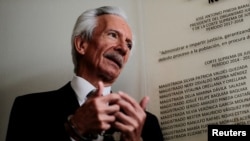When he walked by the military base entrance, French journalist Arthur Jeanne said he couldn't keep his eyes off the machine guns fixed on him as he headed to a high-security prison.
After what Jeanne described as a "frightening" kilometer-long walk to the Mariscal Zavala prison in Guatemala, he came face-to-face with a man he had only heard stories about: José Rubén Zamora.
The imprisoned journalist appeared to be in good spirits.
"From the first second I met him, I noticed he was a really charismatic and impressive person," Jeanne told VOA. "He's been in jail for almost three years now but is still really bright and active."
Zamora, 68, is the founder of Guatemalan newspaper El Periódico. He was convicted of money laundering in a case that Jeanne says is a response to decades of watchdog reporting against the government.
When Jeanne met Zamora in May 2024, the pair chatted for three hours and started to write a story about the history of El Periódico.
The article is included in a special edition of Society magazine titled "The Prison Papers."
The independent French publication partnered with watchdog Reporters Without Borders, or RSF, for the special, which highlights the cases of eight jailed journalists.
'Plea for freedom'
Through interviews, essays and investigations, combined with artwork and photographs, RSF says the collection presents a "powerful plea for freedom."
The idea of "The Prison Papers" began in Society's newsroom a year ago. Thomas Pitrel, one of three editors-in-chief, told VOA that he had long wanted to cover imprisoned and killed journalists.
"It's important for us to show solidarity to our colleagues around the world," Pitrel told VOA. "We are very passionate about our jobs and want everyone to be able to do it in a safe way."
Pitrel initially thought creating a magazine issue featuring imprisoned journalists would be "impossible." Then he connected with RSF.
RSF's staff welcomed the project immediately, Director of Campaigns Rebecca Vincent told VOA. The teams from Society and RSF collaborated to create a list of cases that RSF considered "critical."
The highlighted journalists include Zamora, Hong Kong's pro-democracy publisher Jimmy Lai, and reporters across four continents who are in jail.
"We wanted to do something meaningful and creative to highlight cases we consider top priorities around the world," Vincent told VOA. She hopes the magazine inspires readers to mobilize and increases demands for the release of imprisoned journalists globally.
Initially, Vincent had hoped to get bylines from each of the spotlighted reporters. But, because of the severity of most of the cases, the team had to find creative ways to tell the stories, she said.
Society often had to work through a jailed journalist's family, colleagues or lawyers. Jeanne was the only writer to meet his subject in person, traveling from France to Guatemala to do so.
José Carlos Zamora, José Rubén's son, connected with Jeanne in February and helped arrange the reporter's prison visit.
"I think it was fulfilling and important for my father to continue to do journalism," Jose Carlos told VOA.
Other writers, unable to meet with their correspondents, found creative ways to honor the imprisoned journalists. Pierre-Philippe Berson wrote an essay on censorship in Hong Kong through the lens of food and cooking on behalf of "food-lover" Lai, according to Vincent. On behalf of Eritrean journalist Dawit Isaak, Emilien Hofman and Nicolas Taiana conducted an investigation with his family into the journalist's indefinite imprisonment in Eritrea.
The eight cases featured in the magazine represent a small fraction of the estimated 581 imprisoned journalists around the world, according to RSF.
"We are committed to doing everything in our power to keep their stories alive and present," Vincent said. "Authorities cannot stop these stories from being told; it is futile to keep targeting journalists."




